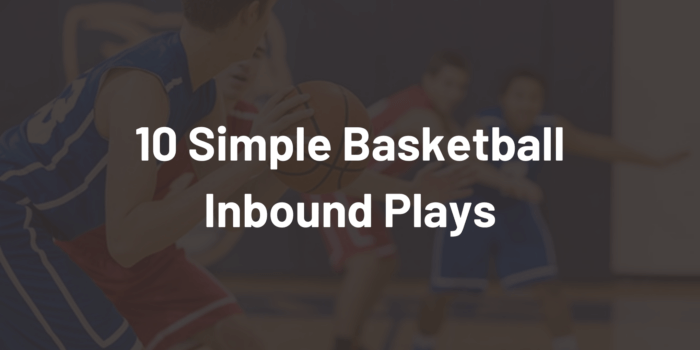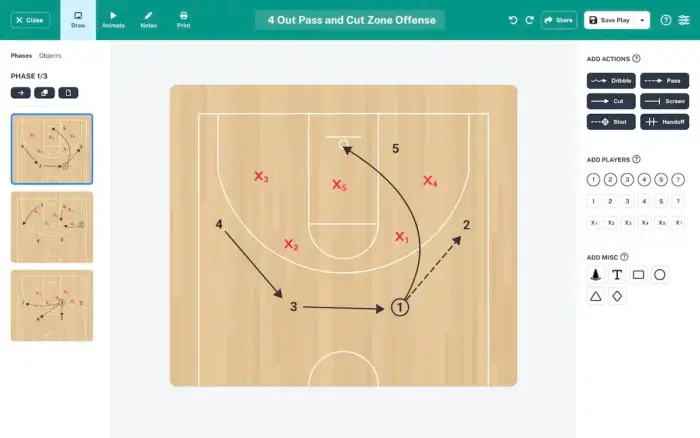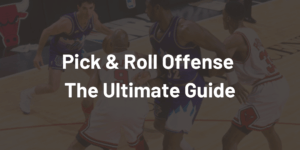Running effective inbounds plays often gets lost in the shuffle of game strategy. Which is a shame, because a well executed inbound play can be a great opportunity to put easy points on the scoreboard!
All plays were drawn up and animated using our intuitive Play Creator App.
When designing inbounds plays, here are a few things to consider:
What is your personnel?
- Assign one or two good passers that know your plays by heart as the default inbounders.
- Make sure that everybody knows their roles. Use your best screeners to free up your best shooters - not the other way around!
What is your goal?
- Have a few plays that try and score directly off the inbounds play and a few that flow into your offensive scheme.
What alignments do you want to use?
- You can set up in the same alignment each play or run different plays from several alignments.
- Having a set alignment for all your plays can keep the opponent guessing by disguising what is coming next
- You might even consider not running set plays at all by teaching your players to simply set screens for each other and make reads!



How does the opponent defend inbounds plays?
- Make sure you have inbounds plays for both man-to-man and zone defense.
- Take note where the player guarding the ball is standing; this will influence where you want to try to score
- Also think of inbounds plays for teams that switch screens.
Baseline Out of Bounds Plays
Every time the ball goes out of bounds under the basket, you will have an opportunity to run a Baseline Out Of Bounds (BLOB) play. These plays occur quite frequently and are a great way to put easy points on the scoreboard because the inbounding passer is very close to the basket.
1. America’s Play
Simple play to get your best shooter a quick look off of baseline out-of-bounds.
Player Roles & Requirements:
- 3 should be a good passer
- 4 and 5 are screeners
- 1 is your best shooter
- 4 pops out to corner. 3 pops out to wing. 2 pops out to wing as well.
- 1 inbounds to 4.
- 4 passes to 3.
- After 4 passes to 3, he sets a screen for 1.
- 1 lulls the defense to sleep or fakes using a screen by 5 before using the screen by 4.
- 3 passes to 1 for the open shot.
- The passer can also look if #5 or #4 are free under the basket in case the defense messes up defending the screen
Coaching Points:
The inbounding player (#1) should look to set the defense up by acting like they aren’t in the play, faking like they are going to use a screen by 5, etc.
Once the defense starts to cheat the play:
- 1 can use a screen by 5.
- 3 can reverse to 2.
- 2 reverses to 1 for the shot
2. 4 Low Clear
"4 Low Clear" is an inbounds play that becomes an isolation set for a driver out of 4-low alignment.
This is a simple set that can get the ball to one of your best playmakers and give them space to make a play.
Player Roles & Requirements:
- 4 should be a driver/playmaker who can get to the rim (or has a mismatch)
- 1 should be a good passer
- 3 should be a good shooter
- 4 pops out to just beyond the elbow
- 1 throws a lob pass over the top to 4
As soon as 4 catches it:
- 5 is going behind the rim to the opposite block
- 2 is cutting from the wing to the corner
- 1 is cutting from out of bounds to the corner
- 4 is facing the basket and driving to the rim
- 4 can either score, pass to 5 if x5 helps, or kick out to 3 if x3 helps
Coaching Points:
- Timing is important here. As soon as 4 catches, the other players need to be cutting to get out the way and give 4 space to operate.
- If 4 can’t score, they should reverse pivot and look to 2 as a safety valve.
- As a counter, if 4 is denied the lob pass, have them go backdoor for an easy layup.
3. Pittsburgh Screen the Screener
Jeff Capel and Pittsburgh ran this play and had some success with it in ACC play.
This is a good set if you have a shooter who you want to get the ball.
Player Roles & Requirements:
- 2 is a shooter/playmaker.
- 5 can score on an inside pass.
- 1 is a good passer/decision maker.
- 2 sets a backscreen for 5.
- 5 cuts to the rim - if they are open, 1 passes to them.
- After screening for 5, 2 runs off a screen for 4.
- After the screen, 4 slips to the rim.
Coaching Points:
- 2 needs to be able to sell that the play is not necessarily for them.
- The better screen that 2 sets, the more help x2 will need to have on 5. If x2 has to help on 5, 2 will be more open.
- 4 can slip to the rim after setting the screen.
4. Barcelona Zone
This is a inbounds play run by Barcelona against a zone defense is a good way to put pressure on the zone in multiple areas.
Player Roles & Requirements:
- 1 should be your best passer
- 4 should a good finisher
- 5 should be a good screener
- 3 should be your best shooter
- 3 cuts hard to the corner (if x3 stays low, 1 can pass to them for the open shot)
- Once 3 gets out of the lane, 5 screens x5.
- 5's goal is to completely take x5 out of the play.
- When 5 sets the screen, this opens up the lane for 4 to cut to an open space.
- Now, x3 must decide whether or not to take the best shooter on the floor (3) or the player cutting down the lane (4).
- 2 cuts behind the defense as a safety valve if nothing develops.
Coaching Points:
- 3 must be SPRINTING to the corner
- 5 must completely take x5 out of the play - they can do this by setting a screen or even posting x5 up
- If 4 doesn’t time this right, it won’t work.
- 4 must also cut into the open gap instead of just going in a straight line
5. Cross Zone
This simple play set is meant to be run against a zone defense.
This can be run at any level - from parks and recreation to college!
Player Roles & Requirements:
- 2 and 3 should be respectable shooters
- 4 and 5 should be able to finish at the rim
- 1 should be a great decision maker/passer
- The play begins with 2 and 3 (shooters) popping out to the corners.
- If the defenders stay in tight, 1 can make this pass for an open shot.
- As 2 and 3 are cutting, 4 and 5 are crossing and cutting to each block.
- 1 must make the proper read based on what x4, x5, and x3 do.
- If x4 stays inside, 1 passes to 3.
- If x4 goes to help on 3, 1 passes to 4.
- If x5 overhelps to the ballside, 5 will be open.
Coaching Points:
- 1 should make the first available pass in this play.
- 4 and 5 are crossing with their cuts - their goal is to confuse x5 and make him choose someone to defend
- If x4 and x3 are guarding the shooters, this puts x5 in a very tough spot.
6. Iowa 4 Across
“Iowa 4 Across” is a good set to have in your arsenal if you need a 3.
You can run this play anytime, but it would be most effective at the end of a game and if teams haven’t seen it before.
Player Roles & Requirements:
- 2 should be your best shooter.
- 3 should be your second-best shooter.
- The play starts with 2 and 3 cutting at the same time.
- 3 cuts over the top of screens by 4 and 5.
- If 3 is open for a shot, they should take it.
- 2 cuts to the rim.
- If 3 does not have the shot, 2 cuts in the middle of the elevator screen by 4 and 5.
- 4 and 5 close the "elevator doors" to not allow x2 to get through.
- 3 passes to 2 for the open shot.
Coaching Points:
- If 3 is open on the cut, they should take the shot (especially in an end of game situation)
7. UConn Last Second Lob
The UConn women’s team ran this play several times at end-of-shot clock situations to get the ball going to the rim.
It’s a simple, but effective set that puts your best athletes in a position to make the play.
Player Roles & Requirements:
- 4 should be your best athlete - someone who go get a lob pass and score quickly (or tip it in)
- 1 should be a good passer
- 2 should be a good shooter
- 5 sets a screen for 4.
- 4 cuts over the top of the screen looking for the lob.
- This is difficult to defend because if x5 just stands there, 4 will be open.
- If x5 helps, 5 might be available for a quick slip.
- After setting the screen for 4, 5 sets a screen for 2.
- 2 cuts hard to the corner - if they are open, 1 throws it to them for a very quick shot.
- After screening, 5 slips to the rim.
- If nothing is there, 1 should throw it up to 5 for a tip-in opportunity.
Coaching Points:
- If all else fails, just throw the ball up to 4 and have them go get it.
- 1 might even throw a simple ball fake to freeze the defense before throwing it over the top.
Sideline Out Of Bounds Plays
When the ball goes out of bounds on the sideline or after timeouts you will have an opportunity to run a Sideline Out of Bounds (SLOB) play. It is more uncommon to see teams run a lot of SLOBs looking to score (due to the fact that it’s farther from the basket). However, having a few options - especially in end of game moments - is important for your inbounds philosophy.
1. Solo
Play Description:
Simple sideline out-of-bounds play to create a two-man game with your best shooter and post player.
Player Roles & Requirements:
- 2 is your best shooter
- 5 is your best post player
- 2 sprints hard off 5's screen. If this is open, we will take it!
- After screening for 2, 5 gets a screen from 1.
- 3 looks for 5 for a lob over the top - this is our primary option.
- If nothing works out early, 1 cuts to the ball after the screen.
- 4 also cuts to the ball, hoping to get a pass and a shot.
Coaching Points:
- 5 sets a screen for 2 to start the play. 2 needs to be sprinting off this screen.
- If 2 is open for the three, he takes it.
- If he’s not open, 2 can pass to 5 in the post.
- There shouldn’t be a lot of defensive help to prevent 5 from getting a decent post touch (especially if x5 helped out 2 cutting to the corner)
2. Zipper
This sideline out-of-bounds play puts the ball into your point guard's hands and immediately leads into a ballscreen.
Player Roles & Requirements:
- 1 should be a good driver/decision-maker.
- 2 should be a good shooter
- 5 should be a good screener
- 4 sets a screen for 1.
- 1 zipper cuts off the screen.
- 3 passes to 1.
- 4 will go to corner after screening.
- 5 is timing the screen so that, as soon as 1 catches it, 5 is there.
- 1 drives off the ballscreen.
- 5 rolls.
- 1 makes the play/read.
Coaching Points:
- Timing is key to this play - if possible, you want 5 arriving to 1 right as 1 catches the ball.
- 5 could decide to “slip” the screen here as well.
3. Winner - Last Second Play
“Winner” is a play to run with limited time on the clock while you have a sidelines out of bounds opportunity.
The multiple actions and movements will hopefully free up a player to get a decent look.
Player Roles & Requirements:
- 5 should be your best/biggest athlete who can make a play at the rim.
- 2 should be your best shooter.
- 1 should be a smaller player (most teams like to switch at the end of the game - this would be a small player on 5 - your big player)
- 2 sprints hard off 5's screen. If this is open, we will take it!
- After screening for 2, 5 gets a screen from 1.
- 3 looks for 5 for a lob over the top - this is our primary option.
- If nothing works out early, 1 cuts to the ball after the screen.
- 4 also cuts to the ball, hoping to get a pass and a shot.
Coaching Points:
- Since this is a last-second play, instruct 3 to throw it to the first available player. You may not get a better look later in the play.
- 1 should be smaller because most teams will switch end-of-game inbounds plays. If the team does this, they have a smaller play guarding your 5.
Create Your Own Plays
Did these 10 inbound plays inspire you to draw up your own plays? All these plays were designed using the basketball play diagram app on thehoopsgeek.com. It's a simple app that allows you to create your own plays using an intuitive drag & drop interface. Check it out yourself here!

Founder of thehoopsgeek.com. A passionate basketball enthusiast and coding geek, Andy combines a love for sports with technology.









I just so happened to come across your website by accident and I just want to say thank you!! It has become very helpful to me. I’m a 2nd grade basketball coach and I love it. I’m not making it complicated for them but I am trying to make it as fun for them as possible. So again, thank you